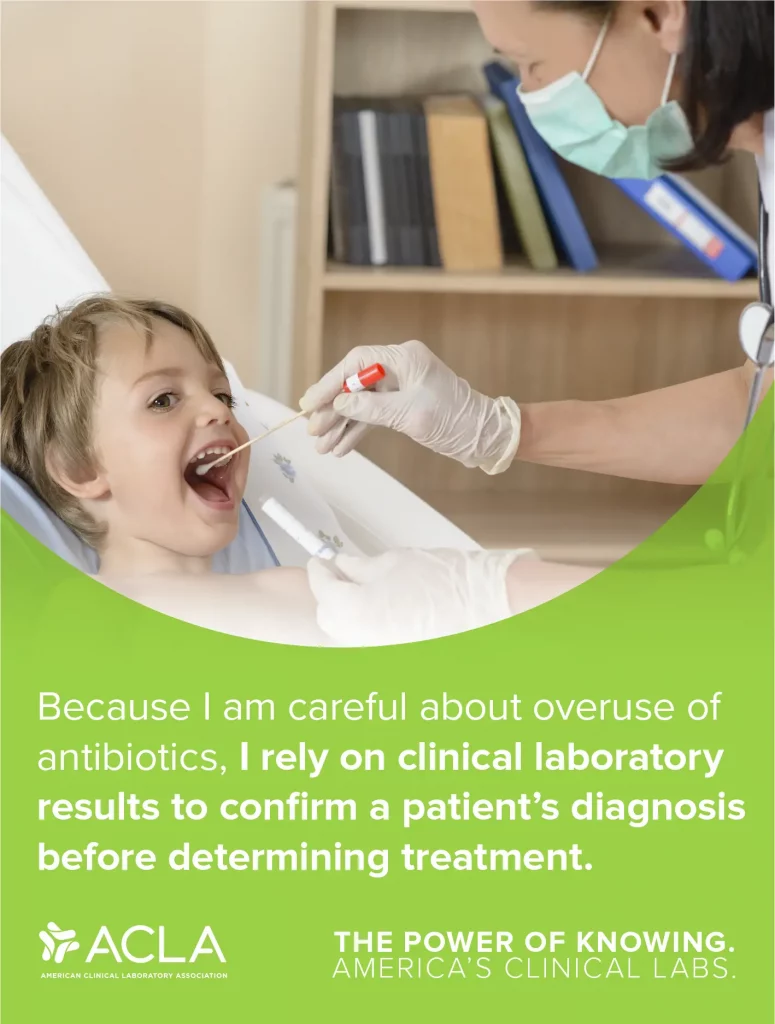
America’s clinical laboratories serve as the foundation for public health preparedness and response, as well as for everyday prevention, diagnosis, and treatment of disease. From routine blood tests to groundbreaking genetic testing that guides therapy selection, laboratories play a crucial role in answering some of life’s most important health questions.
For millions of Americans and their health providers, laboratory tests are the first step in comprehensive care – empowering patients with the answers they need to make informed decisions. In fact, results from laboratory tests inform 70 percent of clinical decision-making, helping to diagnose, monitor, and treat both common and complex conditions. And while these tests are critical to patient care, they account for less than three percent of total health care spending.
Through continued investment in innovation, clinical laboratories are driving extraordinary advancements – transforming health care, improving outcomes, and saving lives.
Ensuring that patients continue to benefit from high-quality laboratory testing requires a strong, sustainable laboratory infrastructure. However, ongoing reimbursement cuts threaten access to these essential services—jeopardizing innovation, delaying diagnoses, and limiting treatment options for millions of Americans.
The Stop Lab Cuts campaign is working to protect the value of laboratory testing and the critical role it plays in patient care. By advocating for fair reimbursement policies, we can help ensure continued access to innovative diagnostic solutions that improve and save lives.
Join us in the fight to protect access to essential testing. Click here to learn more and take action.

Chronic kidney disease (CKD) affects millions of Americans, many of whom are unaware they have the condition. Notably, CKD accounts for nearly 25% of Medicare spending, underscoring the urgent need for earlier detection and better management to improve outcomes and reduce costs. Clinical laboratories are helping address this challenge by providing advanced testing solutions that enable earlier diagnosis and more personalized treatment strategies.
Artificial intelligence is helping enhance diagnostic accuracy, streamlining workflows, and alleviating workforce challenges. AI tools assist in analyzing complex datasets, flagging anomalies in digital pathology, and automating administrative tasks, all while supporting health care professionals in delivering high-quality, personalized care. As adoption grows, AI is enabling laboratories to manage rising demand and improve efficiency without compromising quality.
Companion diagnostics are specialized laboratory tests that help determine whether a patient is likely to benefit from a specific drug or therapy, particularly in cancer care and immunology. By identifying genetic, molecular, or biological markers of disease, these tests provide critical insights into how a patient may respond to treatment. Clinical laboratories are essential in performing and interpreting companion diagnostics, supporting personalized medicine by helping health care providers deliver the right treatment to the right patient at the right time.
Clinical laboratories play a critical role in identifying substance use disorders by providing accurate and timely diagnostic testing. These tests help detect the presence of substances in a patient’s system, enabling providers to make informed decisions about treatment and care. By offering reliable data on drug use, clinical laboratories contribute to early intervention, improved patient outcomes, and ongoing monitoring, all of which are essential in addressing the growing public health challenges posed by substance abuse.
Biomarker testing performed by clinical laboratories uses a patient sample (tissue, blood, or other body fluid) to check for abnormal changes in certain genes, proteins, or other molecules that could indicate the presence of a disease or condition. This type of personalized medicine allows providers to tailor treatments to patients based on their unique genetic makeup, molecular profiles, and disease characteristics.
ACLA is highlighting the crucial role clinical laboratory testing plays in diagnosing common and complex neurological conditions. This Alzheimer’s and Brain Health Month, learn how clinical laboratory tests are utilized to guide disease management and treatment for patients.
Clinical laboratories are committed to delivering innovative tests that help identify, diagnose, and treat disease, like rapid whole genome sequencing (rWGS). This genetic testing method can diagnose any one of thousands of genetic disorders in seven days or less. This makes it uniquely suited for diagnosing rare diseases, especially in infants.
ACLA is underscoring the vital role that clinical laboratories play in the identification and surveillance of antimicrobial resistance. This Antibiotic Awareness Week, learn how specialized clinical laboratory tests are utilized to guide disease management and treatment for patients.
Blog: Clinical Laboratories Empower Patients to Take Charge of Diabetes
November is American Diabetes Month, a chance to bring awareness to the fundamental role of clinical laboratories in diagnosing and managing this chronic, progressive health condition. Diabetes affects more than 37 million Americans, yet more than 20% people who have it are unaware… Read More
Blog: Clinical Laboratories Key To Breast Cancer Diagnosis And Treatment
In the United States, a woman’s average risk of developing breast cancer at some time during her life is about 13%, meaning women face a one in eight chance of developing the disease. October, National Breast Cancer Awareness Month, highlights the burden of this disease to increase patient knowledge and to highlight the critical importance of regular screenings to improve survival rates… Read More
Blog: Understanding the Role of Clinical Laboratories in Supporting Substance Abuse Recovery
Each September, National Recovery Month is an opportunity to highlight the vital role of clinical laboratories in the treatment and support of people in recovery from substance use disorders. Joan Kegerize, Vice President of Reimbursement and Scientific Affairs with the American Clinical Laboratory Association, offers insight on current issues affecting drug testing and clinical laboratories… Read More
Blog: Clinical Laboratories’ Role in Eradicating Cervical Cancer
Clinical laboratory services play a critical role in evaluating womens’ cervical health. The utilization of screening tools, made possible by the ever-advancing capabilities of clinical laboratories, helps diagnose about 13,000 new cases of cervical cancer annually and, just as importantly, helps identify risk factors for hundreds of thousands of women… Read More
Blog: Clinical Laboratory Tests: Essential Tools for Detecting and Managing Heart Disease
This American Heart Month, we are reminded of the vital role that clinical laboratory testing services play in the prevention, detection, and management of heart disease. … Read More
Blog: Clinical Laboratory Tests Offer Line of Defense Against Colorectal Cancer
America’s clinical laboratories play a critical role in the prevention and detection of colorectal cancer, as well as in the identification and monitoring of appropriate therapies. Colorectal cancer is the second deadliest cancer in the United States affecting both men and women … Read More
Blog: Clinical Laboratories’ Role in Informing Kidney Health
During March’s National Kidney Month, ACLA is highlighting the essential role that clinical laboratories serve in the diagnosis and management of kidney health. In the United States, diabetes and high blood pressure are the leading causes of kidney failure, accounting for three out of four new cases … Read More
Blog: Screening, Diagnosis and Treatment are Key to Addressing Nationwide Spike in STIs
April is Sexually Transmitted Infections (STI) Awareness Month, a time to encourage conversation and education around the importance of sexual health in promoting overall wellness. When undiagnosed and left untreated, STIs can lead to irreversible health outcomes … Read More
Blog: Clinical Laboratory Testing Crucial for Women Across Many Life Stages
May is Women’s Health Month – a perfect opportunity to focus on the value clinical laboratories bring to supporting women and their clinicians in evaluating and optimizing their overall health, including testing for diseases and conditions that either disproportionately or solely affect women … Read More
June is Men’s Health Month, an opportunity to focus on the many ways that recommended clinical laboratory testing is essential in assessing, addressing and managing men’s health. In what has been called a “silent health crisis,’’ research shows that, compared to women, men are less likely to see the doctor, and are at greater risk of death from a variety of health issues … Read More